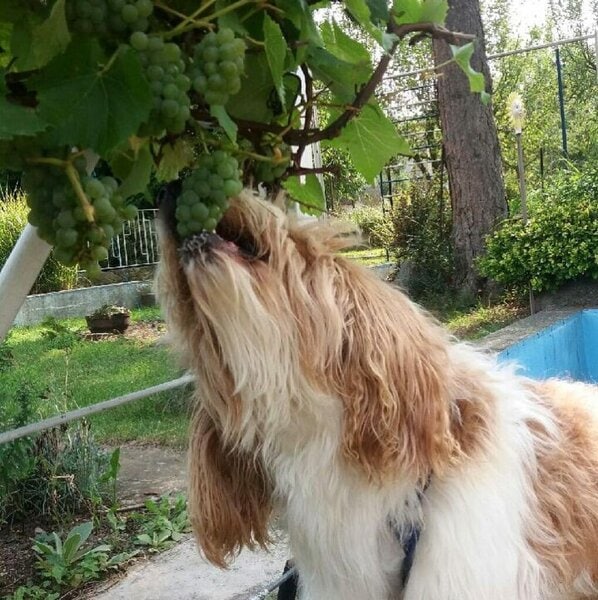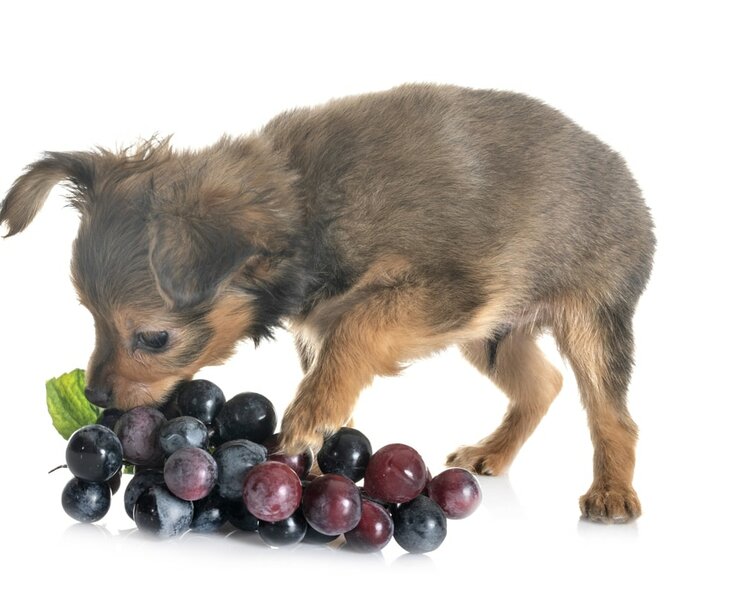It goes without saying that not everything your dog insists on putting into their mouth is actually good for them. However, some potentially dangerous snacks are cleverly disguised as healthy options and none are as dangerous as grapes and raisins.
Dogs cannot eat grapes and raisins mainly because of their known toxicity. So, should you feed your dog grapes and raisins? The answer is a plain and simple no.
Every dog is unique. However, they all seem to have one thing in common which is their love for food and snacking. If you have owned a dog or puppy for more than 2 seconds then you know that most things are fair game for our furry friends as far as snack potential is concerned.
In the sections below, we shall see all that can go wrong if you feed your dog raisins and grapes. You will also learn what to do if your dog sneakily snacks on a grape or two while you are looking away.
Why Can’t Dogs Eat Grapes?

Dogs should not eat grapes as they are known to be incredibly toxic for them. While there are no solid statistics on how many dogs have died from eating grapes, up to 75% of those that develop complications like kidney failure unfortunately don’t survive.
It is not yet clearly understood what exactly it is in grapes that causes such dramatic reactions in the dog’s body. The amount required for the effects is also not set in stone.
For some dogs, it takes only one grape to cause issues while others may have to consume about 50 grams worth of grapes to get sick.
Since it is hard to predict how your dog will react to different grape portions, it is best to play it safe and totally avoid the fruity snacks for your pooch. It also doesn’t matter whether the grapes are peeled or seedless. These specially prepared grapes are causing just as much trouble.
So what exactly are these reactions that your dog can have if they consume grapes? Here are the two main complications you can expect if your dog eats grapes and a few signs and symptoms you may pick up on.
Gastrointestinal Irritation
It will usually take a few minutes to hours after your dog eats grapes for features of gastrointestinal irritation to start being evident. This occurs in dogs that are more sensitive to whatever toxins are present in the grapes.
Here are a few of the signs and symptoms that you may pick up on with your dog.
- Diarrhea
- Vomiting
- Abdominal discomfort (especially when handled)
- Reduced appetite or complete refusal of food
Kidney Failure
Interestingly, not all dogs that eat grapes experience gastrointestinal irritation. However, they almost always suffer from kidney injury and eventually, kidney failure. This usually takes a few days but can manifest after weeks or even months.
Kidney failure in a dog that has eaten grapes will very likely result in their death especially if there isn’t prompt medical attention. Here are a few clues that your dog’s kidneys may be struggling or completely failing.
- Increased thirst
- Dehydration with dry mucous membranes like the nose pad and mouth
- Confusion and erratic behavior
- Initially, increased volume and frequency of urination
- Eventually, little or no urine production
Why Are Raisins Bad For Dogs?
Raisins, like grapes, are toxic to dogs when consumed. In fact, raisins may have more dramatic manifestations as they tend to have more concentrated levels of the toxin responsible for all the trouble. As a result, you should never feed raisins to your dog.
The complications, signs, and symptoms of toxicity in your dog are going to be the same with raisins as they were with fresh grapes. For some dogs, it may take a shorter time for the toxicity to be evident compared to what you will find with grapes.
For some perspective, there are documented cases where consumption of raisins has resulted in kidney failure and death to the dog is as little as 3 days.
In a nutshell, don’t feed your dog grapes or raisins.
What Should I Do If My Dog Ate A Grape?
If your dog eats grapes under any circumstances, the very first thing you need to do is to call your vet and book an emergency visit as soon as possible.
Here is a bit more on this and other ways you can help improve the outcome for your dog.
Immediate Veterinary Care
When a dog eats grapes or raisins, it is considered a poisoning emergency and you should definitely be concerned. Taking your dog to the vet promptly will greatly increase their chances of survival.
At the vet’s clinic, your dog will be thoroughly examined to determine the extent of damage already caused by the grapes or raisins. The vet will then determine the most appropriate cause of action depending on how critical the dog’s situation is.
Prepare yourself for the likelihood that your dog may need to be admitted at the vet hospital for further observation and care. However, in very rare situations, you may get to take your dog home on the same day especially if all the grapes did was irritate the dog’s gut.
Call A Dog Poisoning Hotline
If you don’t have a vet on call or close by, a useful alternative will be to call a pet poisoning hotline. For this, just look up pet or dog poisoning control services or helplines in your area.
You can also call the Animal Poison Control service from the American Society for the Prevention of Cruelty to Animals (ASPCA) at (888) 426-4435. They are available 24/7, all year round and will help you figure out the next best cause of action to save your dog.
Keep The Dog Hydrated And Comfortable

Once your dog has received adequate vet care and is released to go home, you will still have to ensure that they are well taken care of to guarantee a full recovery.
The most important thing to do is to ensure that your dog is adequately hydrated. This is because they will lose a lot of water from the vomiting, diarrhea, fever, and increased urination during the early stages of kidney failure.
For this, just make sure they have free access to fresh water all day. You can also incentivize them to drink water by adding some bone broth for flavor.
Furthermore, ensure that your dog is generally comfortable as they recover. This means having a clean and safe place to rest.
Comfort for your dog also means avoiding any excessively excitable situations. So keep exercise sessions to a minimum with low intensity activities like walks. You should also avoid any changes to their environment, such as having new pets or strangers in their space while they recover.





